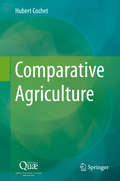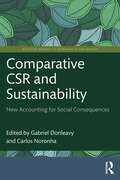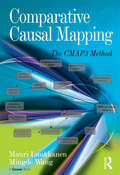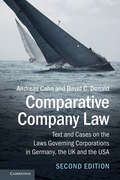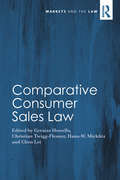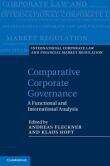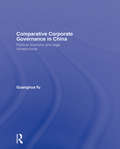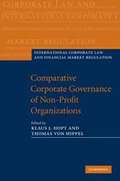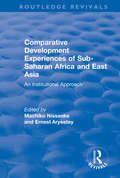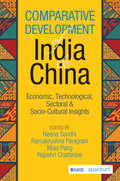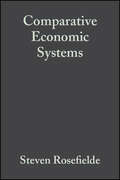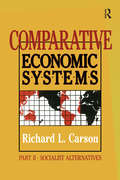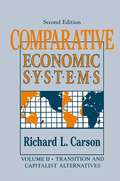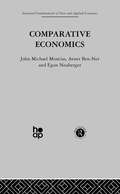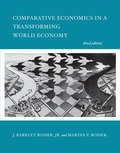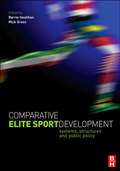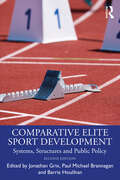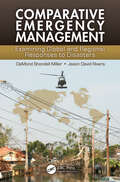- Table View
- List View
Comparative Agriculture
by Hubert CochetIn the first section dedicated to theoretical thoughts on comparative agriculture, Hubert Cochet introduces the notion of "agricultural development", the very subject of comparative agriculture, with a restored endogenous dimension. He then describes how this approach was slowly consolidated, around the concept of agrarian system in particular. The comparison of agricultural transformations in time and space highlights the importance of the comparatist approach to production processes, their trajectories and differentiation on a worldwide scale. The second section which focuses on the methods and expertise of comparative agriculture, tackles the issues of landscape analysis, field surveys and the historical approach underlying comparative agriculture. It sums up the economic tools mobilised as well as the evaluation perspectives opened up by comparative agriculture.
Comparative Analysis of Interim Measures – Interim Remedies (Contemporary Commercial Law)
by Vivek Jain Thomas Macey-Dare Shengnan JiaInterim remedies and provisional measures are a critical component of civil/commercial litigation and arbitration. The objective of this book is to set out not just the law and practice in relation to the primary interim remedies and preservation measures available in England & Wales and China, but also to provide the comparative analysis between the two jurisdictions concerning these interim measures. The system for interim remedies in England & Wales is well-established, but preservation measures in China are a work in progress and many differences exist between the two legal systems, both in terms of theory and practice. For example, China does not recognise the general concept of interim measures, if looked at from the English law point of view, though it does have similar concepts of Property preservation, evidence preservation and behaviour preservation. China has recently adopted Chinese Civil Code 2020 and in writing this book the authors have incorporated all the relevant elements from the new Code. There is no equivalent of Practice Directions in China, and this book provides provide much needed clarity on this area, drawing together the law and guidance which is presently scattered across numerous local courts in the different provinces. This is an important book that is likely to have a significant impact on existing scholarship regarding interim remedies in England, Wales and China, and be of interest of all parties involved in cross-border litigation. Its readership will include industry professionals, academics, policy-makers and government officials.
Comparative CSR and Sustainability: New Accounting for Social Consequences (Routledge Research in Sustainability and Business)
by Gabriel Donleavy and Carlos NoronhaThis book breaks new ground by providing a structured and cohesive set of contributions on the actions, developments, problems and theories of corporate social responsibility (CSR). With new case studies from the UN’s Least Developed Countries (LDCs), contributors in this book investigate how firms in Eastern and Western countries are responding to and making use of evolving CSR guidelines. The book addresses the following questions: is CSR simply greenwashing or an authentic commitment to responsible corporate citizenship? Has globalization drawn CSR conduct in LDCs closer to that of industrialized countries? Stakeholder theory, actor–network theory and a new orbital theory of accountability are applied to give coherence to the case studies. Other chapters address greenwashing in reports, the impact of CSR in socially stigmatized occupations, an analysis on what responsibility precisely entails in CSR, and the interface between law and CSR. The book also considers the impact of COVID-19 on the hospitality industry, and includes a contribution from Ukrainian scholars, one written while their city of Kharkiv was under attack by Russian forces. This book will be a useful reference to those interested in discussions on crises, climate change, and SDGs and realizing sustainable goals through CSR.
Comparative Causal Mapping: The CMAP3 Method
by Mauri Laukkanen Mingde WangComparative Causal Mapping: The CMAP3 Method, by Mauri Laukkanen and Mingde Wang, is an introduction to the conceptual backgrounds of causal (cognitive) mapping and to the typical methods in comparative and composite causal mapping, based on either interview or questionnaire primary data or on secondary documentary data. The discussed CCM research is supported by CMAP3, a freely downloadable (www.uef.fi/cmap3) Windows software platform for CCM studies. The book has three parts. The first discusses the theoretical underpinnings and methodological issues in causal mapping including the target phenomena and different interpretations of causal maps/mapping, the motives for using CCM methods and the criteria of method selection. The second part focuses on the technical aspects of using CMAP3 in typical CCM research. The third part presents three CCM study cases: a classical document-based study; a semi-structured interview-based (SIM) study; and a methodological study comparing SIM with an electronically administered structured hybrid CCM approach. In addition to demonstrating CCM practices, they suggest that different methods produce divergent results and are thus not substitutable. The research task should determine which CCM approach is appropriate. The book will appeal to both academic and professional audiences, in particular to doctoral students and experienced researchers looking for new topics and method approaches, but also to practitioners in fields such as management and organization studies, organizational development, public policy and education, and knowledge management.
Comparative Company Law
by David C. Donald Andreas CahnIt can be difficult for students of comparative company law both to understand the internationally relative nature of a legal system and grasp it in practical detail. This book is designed to address that problem. Each chapter begins with a discursive analysis of the laws in Germany, the UK and the USA, framed by a comparative presentation. Chapters also contain edited judicial decisions from at least two of the jurisdictions, which allow readers to perform their own comparisons in more detail and leave room for original analysis and discussion.
Comparative Company Law: Text and Cases on the Laws Governing Corporations in Germany, the UK and the USA
by David C. Donald Andreas CahnWhen comparing the laws of different jurisdictions, one often sees only the forest or the trees. This is particularly problematic in comparative company law, where students hope both to understand the overall framework of the law and grasp its practical application. This text's structure, now in its second edition, solves that dilemma. Chapters open with discursive analyses of the law in each of Germany, the UK and the US (Delaware, the ABA Model Business Corporation Act, and federal securities laws) and set out the high-level governing framework, particularly for the EU and its member states. This analysis is succinct and pointed, with numerous references to both the law and leading scholarship. The whole text is arranged to highlight comparative aspects. Diagrams are used where helpful. Chapters close with edited judicial decisions from at least two of the jurisdictions discussed, which allows fresh exploration of comparison in more detail, and pointed questions to guide class discussion.
Comparative Consumer Sales Law (Markets and the Law)
by Christian Twigg-Flesner Geraint Howells Hans-W. Micklitz Chen LeiFor many years, legislators around the world have responded to the particular needs of consumers by introducing dedicated rules for consumer sales contracts. In the European Union, a significant push came through the adoption of the Consumer Sales Directive (99/44/EC). Elsewhere in the world, legislation focusing on consumer sales contracts has been introduced, for example in New Zealand and Australia. This book offers a snapshot of the current state of consumer sales law in a range of jurisdictions around the globe. It provides both an overview of the law in selected jurisdictions and compares the application of these rules in the context of two case scenarios.
Comparative Corporate Governance
by Klaus J. Hopt Andreas M. Fleckner#"This book has grown out of a conference entitled 'Comparative Corporate Governance, an International Conference, United States-Japan-Western Europe' which was held in Brussels on 14 June 1995"--Pref.
Comparative Corporate Governance in China: Political Economy and Legal Infrastructure
by Guanghua YuAn insightful overview of the political, legal and social perspectives which inform corporate governance in China, this book examines the challenges of corporate governance faced by Chinese corporations and international corporations operating in China. Unlike other texts that tend to focus solely on the board of directors and the takeover market, Yu has enlarged the scope of this study to cover both market forces and contractual mechanisms, providing readers with an extended and comprehensive discussion of the pertinent issues. It explores a range of issues and their role in corporate governance models, including: executive compensation takeover markets the securities market insolvency issues venture capital market Examining the current climate and making the case that comparative corporate governance studies have significant policy implications for China’s transitional economy, Yu has put together a book that is a valuable resource for students and those working in Asian business, corporate governance and commercial law.
Comparative Corporate Governance of Non-Profit Organizations
by Klaus J. Hopt Thomas Von HippelThe economic importance of the non-profit sector is growing rapidly in the USA and Europe. However, the law has not kept abreast with its development. The European Court of Justice has extended certain freedoms of the EC Treaty to non-profit organisations, and more case law is expected to follow in the near future, but the observations, theories, solutions and legal and non-legal rules in this field are manifold. The chances of harmonising the law on a European level are slim. Despite these differences, a common core of international corporate governance problems and regulatory solutions can be seen. This volume of essays brings together a variety of international experts from both corporate governance and governance of non-profit organisations to compare the two areas and explore the lessons that can be learned regarding comparative corporate governance for non-profit organisations.
Comparative Corporate Governance: A Research Overview (State of the Art in Business Research)
by Thomas ClarkeCorporate governance developed to maintain the accountability, stability, and performance of corporations. It has evolved to concern not just the financial health of the company, but its social and environmental impact. There is considerable international institutional diversity in corporate governance. The role and significance of market institutions varies among different governance systems. This work provides a concise insight into the defining impulses of late twentieth- and early twenty-first-century corporate governance evolving through a series of competing epoch-making paradigmatic contests. The present paradigm highlights a shift towards corporate sustainability involving the corporate delivery of long-term value in financial, social, environmental, and ethical terms. In analysing the purpose of the company and the definition of value creation, the hegemony of agency theory and shareholder primacy is challenged. More expansive theoretical explanations are considered which recognise the deeper values companies are built upon, the wider purposes they serve, and the broader set of relationships they depend upon for their success. This book will be of value to researchers, scholars, and students in corporate governance, sustainability, business, and accounting. Managers, professionals, and other general business readers will also find this text of interest.
Comparative Development Experiences of Sub-Saharan Africa and East Asia: An Institutional Approach
by Ernest AryeeteyTitle first publishedin 2003. This comprehensive book focuses on the prevailing conditions in Asia and Africa under various macroeconomic and sectoral themes in order to provide in depth explanations for the divergent development experiences of the two regions. Seeking to go further than the simple comparison of policies, the book carefully examines the institutional context for policy implementation within which growth and development have proceeded in the regions.
Comparative Development of India & China: Economic, Technological, Sectoral & Socio-cultural Insights
by Neena Sondhi Ramakrushna Panigrahi Miao Pang Rajashri ChatterjeeThe prodigious economic growth of India and China over the last three decades has ensured their rightful prominence in the global economic order. The two players opened up their respective economies to liberalization and market regulations, which led to a tectonic shift from agriculture-based economies to manufacturing and service-based economies. In this context, Comparative Development of India and China offers contemporary research on economic, technological, sectoral and sociocultural issues by highlighting the opportunities as well as vulnerabilities in the development of the two fastest growing nations in the world. It unveils the similarities of thought and practices, and explores the plethora of possibilities for collaborative effort that may serve to contribute to the prosperity and progress of both the countries. The perspectives presented by various Indian and Chinese scholars in this edited volume provide varied outlooks and insights on these two nations, albeit within a single thematic framework.
Comparative Dynamics in the Comics Industry: Contrasting Cultures in France, Belgium, and the Netherlands (Routledge Focus on Business and Management)
by Rudi de VriesDue to the enormous cultural and economic impact of the Marvel movies, manga, and anime, research on the comics industry is growing, but has focused primarily on the US and Japan. This book focusses on the European comics industry to explore the complex impact of organizational and cultural differences in audience behaviours, both in the comics industry specifically and in the creative industries in general.Drawing on the author’s research on the contrasting comics culture of the Netherlands, Belgium, and France, the study uses institutional theories and organizational ecology to compare the interactions of publishing organizations with artists, audiences, and each other. It combines this with a critical approach to modernization theory to evaluate how historical, cultural, and religious factors might impact the audience for comics and how those audiences respond to and interact with this specific creative medium. The book demonstrates the benefits of using combinations of theoretical frameworks to draw out more nuanced interpretations for this and other under-researched creative industry areas.With its unique insights, this book will be of great interest to researchers in the comics industry, as well as a fascinating contribution to research in cultural-related audience behaviour for all scholars in the creative industries.
Comparative Economic Studies in Europe: A Thirty Year Review (Studies in Economic Transition)
by Wladimir AndreffThis book is written in honor of Horst Brezinski and explores a wide and diverse range of topics related to comparative economic studies. Containing contributions from a number of former Presidents of the European Association for Comparative Economic Studies, the chapters discuss the hard budget constraint, economic transformation in Central Eastern Europe, illiberal democracy, sovereign wealth fund, higher education, the euro, the shadow economy, multinational companies, and economic power. Additional attention is given to new areas of study such as the digital economy and sports economics.This book aims to examine comparative economies across a wide range of geographical areas including China, Hungary, the United Kingdom, Poland, and the United States and will be relevant to those interested in emerging and transition economies, the political economy, economic policy, and international relations.
Comparative Economic Systems: Culture, Wealth, and Power in the 21st Century
by Steven RosefieldeComparative Economic Systems: Culture, Wealth and Power in the 21st Century explains how culture, in various guises, modifies the standard rules of economic engagement, creating systems that differ markedly from those predicted by the theory of general market competition. This analysis is grounded in established principles, but also assumes that individual utility seeking may be culturally determined, that political goals may take precedence over public well being, and that business misconduct may be socially detrimental.
Comparative Economic Systems: Market and State in Economic Systems (Comparative Economic Systems Ser. #Vol. I)
by Richard L. CarsonComparative Economic Systems is published in three editions, one for each major part. This is Part II and covers Socialist Alternatives, looking at the Hungarian Economy, the structure and trends of the Chinese economy, the Yugoslav workers self-management, planning, agriculture and foreign trade
Comparative Economic Systems: Transition and Capitalist Alternatives (Comparative Economic Systems Ser. #Vol. I)
by Richard L. CarsonFirst Published in 2017. Routledge is an imprint of Taylor & Francis, an Informa company.
Comparative Economics
by A. Ben-Ner J. Montias E. NeubergerThe reasons, methods, and outcomes of system change in general, and in Russia and Eastern Europe in particular are analyzed, using the analytical apparatus developed in the monograph.
Comparative Economics
by John-Michael MontiasFirst published in 1994. The reasons, methods, and outcomes of system change in general, and in Russia and Eastern Europe in particular are analyzed, using the analytical apparatus developed in the monograph.
Comparative Economics in a Transforming World Economy (2nd edition)
by J. Barkley Rosser Marina V. RosserThis second edition of an innovative undergraduate text offers an approach to understanding different economic systems that reflects both recent transformations in the world economy and recent changes in the field of Comparative Economic Systems.
Comparative Economics in a Transforming World Economy, third edition
by J. Barkley Rosser Marina V. RosserAn approach to comparative economic systems that avoids simple dichotomies to examine a wide variety of institutional and systemic arrangements, with updated country case studies.Comparative economics, with its traditional dichotomies of socialism versus capitalism, private versus state, and planning versus market, is changing. This innovative textbook offers a new approach to understanding different economic systems that reflects both recent transformations in the world economy and recent changes in the field.This new edition examines a wide variety of institutional and systemic arrangements, many of which reflect deep roots in countries' cultures and histories. The book has been updated and revised throughout, with new material in both the historical overview and the country case studies. It offers a broad survey of economic systems, then looks separately at market capitalism, Marxism and socialism, and “new traditional economies” (with an emphasis on the role of religions, Islam in particular, in economic systems). It presents case studies of advanced capitalist nations, including the United States, Japan, Sweden, and Germany; alternative paths in the transition from socialist to market economies taken by such countries as Russia, the former Soviet republics, Poland, China, and the two Koreas; and developing countries, including India, Iran, South Africa, Mexico, and Brazil. The new chapters on Brazil and South Africa complete the book's coverage of all five BRICS nations; the chapter on South Africa extends the book's comparative treatment to another continent. The chapter on Brazil with its account of the role of the Amazon rain forest as a great carbon sink expands the coverage of global environmental and sustainability issues. Each chapter ends with discussion questions.
Comparative Elite Sport Development
by Barrie Houlihan Mick GreenThere is a paucity of academic work in the area of elite sport development despite there being ample evidence that achieving international sporting success is of increasing importance to the public (exemplified by consistent media interest in elite success or the lack of it) and to governments in most developed countries who have, almost without exception, increased the level of public funding for elite squad development often to the detriment of other sports policy objectives such as increasing general levels of participation.Comparative Elite Sport Development: systems, structures and public policy focuses on the identification and development of elite sporting talent especially in Olympic sports. Written by a team of international contributors it applies a reflective and analytical approach, and both informs, and is informed by, established bodies of theory in policy analysis. Uniquely, it adopts a comparative approach of policy rivals, leading 'sports powers' and policy innovators, which provides broad and thorough analytical coverage.
Comparative Elite Sport Development: Systems, Structures and Public Policy
by Barrie Houlihan Jonathan Grix Paul Michael BrannaganNow in a fully revised, extended and updated new edition, this is the only book to offer a comparative overview of the development of elite sport systems around the world. The book examines sport policies and programmes in 20 developed and developing countries that have achieved international sporting success, including the United States, the United Kingdom, China, Japan, Brazil, Russia, Australia, and South Korea, helping the reader to understand the factors behind that success. For each country, it sets out the historical and political context in which elite sport has developed, before explaining the country-specific structures of elite sport and the investment that each country has made in elite sport development. The book also considers how countries have used the hosting of mega-events as sport policy tools, and how factors such as geo-politics, states’ governance and political ideology, and levels of economic development, all have influence on national sport policy. Introducing the foundational concepts and principles of elite sport policy and development, and showing how those policies shape global sport, this book is fascinating reading for all students, researchers, policymakers and practitioners working in sport development, sport policy, sport management, event management, public policy, and political science.
Comparative Emergency Management: Examining Global and Regional Responses to Disasters
by Jason David Rivera DeMond Shondell MillerA host of natural and man-made disasters have plagued the world in the twenty-first century, many with significant global impact. The Deepwater Horizon Oil Spill, the Indian Ocean tsunami, and Hurricane Katrina all affected broad regions with devastating results. The need for better emergency management policies, procedures, and cooperation among n
